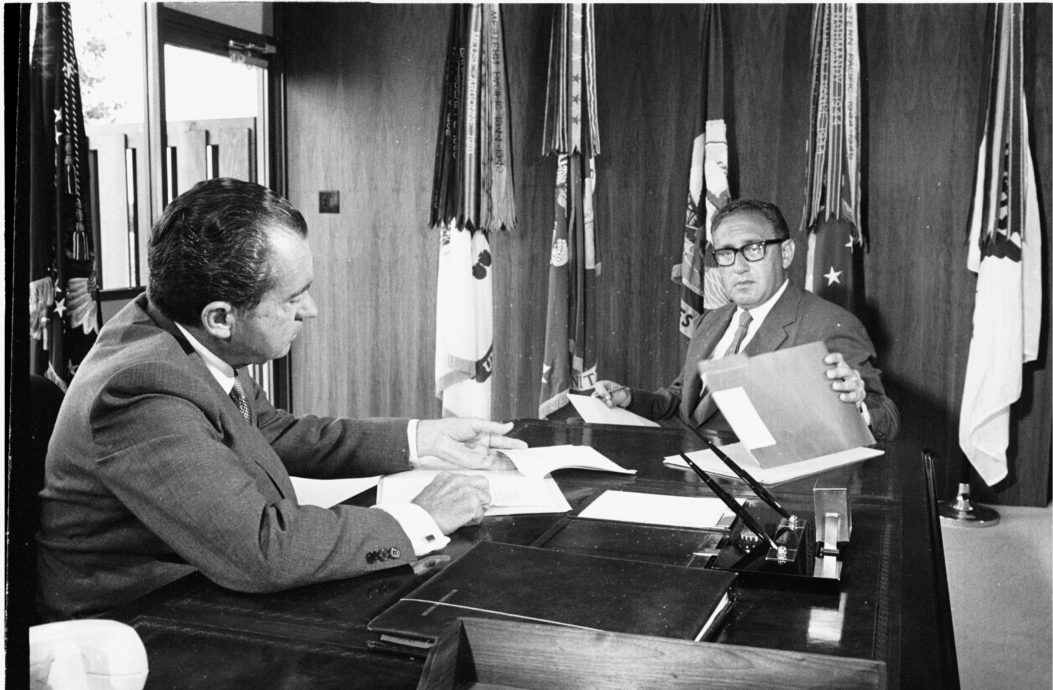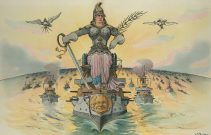Eliot Cohen presents a world full of threats, but not all of them are best addressed with military power.
The Tragic World of Henry Kissinger
As National Security Council chairman and Secretary of State in the Nixon Administration, and then remaining at State in the Ford Administration (unscathed by Watergate), Henry Kissinger drew upon himself the ire of critics ‘Left’ and ‘Right.’ He hardly could have done otherwise. The period 1969-1975 saw the agonizing final years of the Vietnam War, the beginning of the controversial policy of détente with the Soviet Union, and America’s dramatic ‘opening’ to Communist China. But it was preeminently Kissinger’s underlying strategic approach to these events that offended and sometimes enraged his opponents. Kissinger was a foreign-policy ‘Realist,’ as distinguished from the foreign-policy ‘Idealists’ who predominated not only in Washington but in the media and in academia.
Barry Gewen defines foreign-policy Realism as the insistence that international politics be understood in terms of economic, geopolitical, and military power and of national interest. In view of the catastrophic character of war, especially in the past two hundred years, as weapons technology has advanced and civilian populations have been targeted for destruction, Realists characteristically seek peace militarily through deterrence, and diplomatically through balancing rival powers against one another. Foreign-policy Idealists, by contrast, attempt to transcend the practices of power-politics with reference to moral principles—typically, human rights—which they attempt to instantiate in political institutions, international or domestic.
Realism as Bogeyman
Following Kissinger’s account of the matter and also that of his highly influential intellectual friend, University of Chicago political scientist Hans J. Morgenthau, Gewen classifies foreign-policy Idealists into two main types: on the Left are the liberal internationalists, who seek peace through such constructs as the League of Nations, the United Nations, and other ‘world-order’ institutions; on the Right are the heirs of Montesquieu’s commercial-republican peace theory (often miscalled ‘democratic’ peace theory), who hold that peace will advance only insofar as commercial-republican regimes replace oligarchic and tyrannical ones. This leads Idealists of the Right to advocate regime change or revolution in countries ruled by ‘the few’ or by ‘one.’
Gewen has designed this impressive and substantial book with considerable care. Knowing that most of his readers will adhere to one or the other Idealist schools, he draws them into a dialogue with Realism, initially by stating their own opinions for the most part fully and fairly. He then leads those readers through Kissinger’s analyses of specific issues. These include the Nixon Administration’s economic warfare against the socialist regime of Salvador Allende in Chile, the policy of ‘Vietnamization’ by which the United States extricated itself from the war in Southeast Asia, the rationale for détente with the Soviet Union, and the geopolitical counterbalancing of the Soviets with the equally tyrannical Maoist regime in China. As he does so, Gewen shows that the Realist way has a political and even moral heft of its own, not to be dismissed by those who wish the world were, or could be, a much better place than it is.
Against Democratic Faith
Like Morgenthau, Kissinger drew intense criticism for lacking a thoroughgoing enthusiasm for democracy. When Chileans elected Allende, a Marxist admirer of Fidel Castro, to the presidency in 1970, Kissinger said, “I don’t see why we have to stand by and watch a country go Communist because of the irresponsibility of its people.” As Gewen shows, Kissinger spoke from experience, his parents having fled Nazi Germany in the 1930s when he was an adolescent; many of the relatives they left behind died in the death camps. Kissinger was old enough to have seen how Hitler not only rose to power through democratic elections but became increasingly popular with Germans in the years preceding and during the world war. Without of course imagining Allende to have been anything resembling Hitler, Kissinger nonetheless determined that Soviet and Cuban support for the Chilean socialists should be matched by American support for their opponents. The economic boycott Nixon ordered weakened the regime, which eventually was overthrown by military officers who were themselves initially reluctant to reverse the results of an election.
In the larger sense, Kissinger distrusted any highly democratized political regime. Europe had done best when an aristocratic class with a shared code of honor negotiated across national borders, limiting wars and working for an international balance of power. The Napoleonic Wars following the French Revolution were a product of democratic excesses, and the world wars of the twentieth century registered the character of increasingly democratized political societies prey to hyper-nationalist, demagoguery by Idealists of one sort or another.
At the same time, insofar as democratic societies retained elites, these consisted not of experienced, prudent, old-regime and old-school aristocrats but of data-driven bureaucrats pretending to replace practical judgment with social science—the scientific status of which Kissinger rather doubted. Social scientists lack the capacity to make sound judgments because, following the sociologist Max Weber, consigned judgment to the realm of ‘values,’ values to the realm of emotion, leaving little room in moral and political thought for prudential reasoning. Because modern science tends toward reductionism, social science reduces political life, including foreign policy, to sub-human elements—typically, economic interests and social classes.
In recent years, cyberspace operates in much the same way. Once “the province of a small clique of educated specialists privileged with arcane knowledge,” computers had become ‘democracratized’—available to “anyone with a keyboard and a desire to shape the future of mankind.” Not only has cyberspace become a sort of “Hobbesian state of nature,” but, like modern science generally, it encourages what Kissinger called “the mind-set of a researcher”—a fact-finder, a data collector—not that of a thinker. By contrast, “learning from books places a premium on conceptual thinking, the ability to recognize comparable data and events and project patterns into the future.” Facts are indispensable to a statesman, but they do not by themselves generate a strategy. If all learning ‘goes on-line,’ who will do the thinking?
Modern bureaucratic elites attempt to fill the space between democracy and ‘value-free’ social science with historicist progressivism, as seen most prominently in the influential thought of John Dewey, who attempted to weld the experimentalism of modern science with moral claims on behalf of social equality. With Morgenthau, Kissinger simply did not believe that any sensible foreign policy could be derived from such materials, pointing to the fact that none had successfully done so. Accordingly, his years in Washington saw Kissinger struggling to wrest control of policy from State Department bureaucrats.
Nixon and Kissinger inherited the Vietnam War from the Johnson administration. Kissinger had visited South Vietnam several times during the Johnson years, concluding that the United States had no credible military or political strategy there, and that American officials in the country knew very little about the people they were attempting to save from the Communists. With Nixon, he decided that America had more important concerns—specifically, relations with the Soviet and Communist Chinese sponsors of the Vietnamese Communists. “Vietnamization” of the war meant gradual withdrawal of American troops coupled with training and supplying the South Vietnamese allies, whose ground troops would continue to receive support from the U.S. Air Force. Gewen judges this strategy to have been the least bad of three bad choices, the others being the obliteration of substantial portions of Communist North Vietnam on the one hand, or a precipitate pullout on the other. The latter course, Gewen concedes with regret, would have put American credibility in question with allies throughout the Pacific. Like it or not, credibility counts in politics, foreign or domestic. Kissinger deplored the cutoff of material support to the South Vietnamese when the Communists made their final, and successful, attempt to take control in 1975. Now Secretary of State in the Ford administration, he was forced to sit by and watch as the Communists proceeded to murder a minimum of 80,000 Vietnamese in the South.
Détente didn’t work because regimes based on such principles finally will not cooperate with regimes founded on the natural rights to life and liberty, except for tactical purposes.
Regarding the Cold War as a whole, Nixon and Kissinger pursued two main policies: détente with the Soviets and support for the divisions within the worldwide Communist movement itself. Détente was a term coined by French president Charles de Gaulle, meaning the relaxation of tensions between Soviet Russia and the Western republics; Gewen identifies it as a new name for the Realists’ balance of power. Mutual deterrence of nuclear war having been achieved, the Cold-War rivalry now consisted of smaller, more manageable wars along with economic and political competition. Accordingly, advocates of détente rejected regime change in the Soviet Union and China as infeasible in the short or medium term, rejecting what they took to be Idealist calls for strong advocacy of human rights within those regimes.
Taking Détente Too Far
When President Reagan took office in 1981, Kissinger joined many in Washington circles in dismissing him as a potentially dangerous, democratic-populist simpleton. As the Reagan years went on, however, Kissinger saw that the supposedly risky and impractical policy of ending the Soviet regime instead of living with it wasn’t precipitating a nuclear holocaust but was wringing ever-increasing concessions from a regime whose internal flaws were becoming increasingly critical under American pressure. In a rare admission that he might have been mistaken, in the end Kissinger conceded that he may have taken détente too far.
It is important to see why he was mistaken. Gewen argues that Kissinger was a sort of Nietzschean. In an inherently meaningless cosmos, life (including life as lived by nation-states) consisted of the will to power and the struggle for power by more or less powerful wills in a “planetary aristocracy.” But Gewen also shows that Kissinger himself, for all his emphasis on power-politics as the foundation of geopolitical analysis, had no interest whatever in the Nietzschean precept, “Live dangerously.” Quite the contrary. Kissinger’s goal was identical to that of Hobbes: self-preservation, now widened to include the self-preservation of humanity, threatened as it was by modern military technology. This isn’t Nietzscheism; it is modern liberalism.
Moreover, Kissinger’s morality was decidedly non-historicist. Rather than deriving moral and political right from any supposed historical dialectic, or even from the traditionalist historicism of the Right, Kissinger derived it from what he called the inherent and unchanging nature of human beings. To be sure, human beings are not perfectible; the consequences of human actions are not predictable; and solution to human problems are always impermanent. Hobbes and Locke insisted on no more. It was the German Idealists and their epigone who expected the course of events or ‘history’ to elevate human nature into something more than it is. And this includes Nietzsche, who longed not for the preservation of man but for the advent of Superman.
Kissinger went too far with détente not because he was amoral but because he went too far with Realism. To understand geopolitics simply as a matter of power, albeit power defined not only militarily but economically and in terms of diplomatic negotiations, is to downplay the importance of regimes. In making overtures to Maoist China (for example), Nixon and Kissinger played power-politics against Soviet Russia, and arguably played it well. But to describe Mao (or Lenin, or Stalin) simply in Realpolitik terms is to leave unexplained what men like Aleksandr Solzhenitsyn and Vladimir Bukovsky (neither of whom rates a mention in the book) made plain: Neither Realism nor nationalism can explain a deliberate policy of mass murder. That policy is only explicable in terms of the radicalized progressivism of Marxist-Leninist ideology, which those tyrants espoused, and upon which they built their regimes. Similarly, on the Right, Hitler’s policy of genocide cannot be explained in terms of Realism or even of nationalism, only by the historicized ‘race science’ that imagined such an enormity as an engine of progress.
Détente didn’t work because regimes based on such principles finally will not cooperate with regimes founded on the natural rights to life and liberty, except for tactical purposes. Such regimes live dangerously in principle, even when practicing caution. Reagan saw that. And he was right to think that if right doesn’t simply make might, it is one component of lasting might, even if it is no guarantee that any regime, or any country, will wield might, or pursue right, forever. Barry Gewen has written the most thoughtful book on Kissinger we have, offering the most accurate, fair assessment of his policy intentions. He has written what amounts to a history of American foreign policy since the Second World War—a history seen through the prism of Kissinger’s mind and career, to be sure, but no ordinary mind and career.



